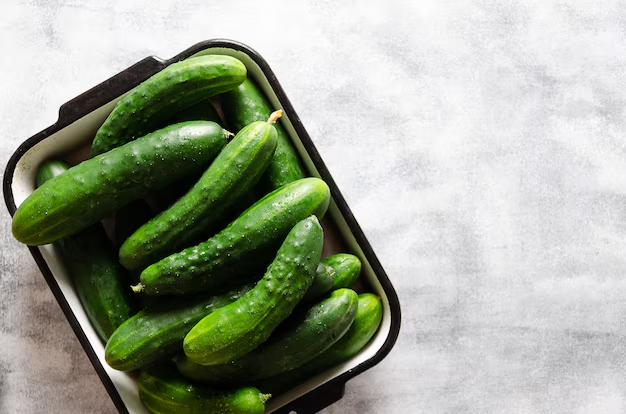The Ultimate Guide: Should You Refrigerate Cucumbers or Not?
Picture this: you walk into your kitchen after a long day, hoping to whip up a refreshing salad. You open the fridge and glance at the crisp drawer, wondering if you should toss those cucumbers in there. Refrigeration is often a reflex when it comes to storing fresh produce, but is it the best choice for cucumbers? This guide dives into the crunchy dilemma: should cucumbers be refrigerated? We'll explore the pros and cons, share expert insights, and help you make an informed decision.
🌱 Understanding Cucumbers: A Quick Overview
Before we answer the big refrigeration question, let's understand cucumbers a bit better. Cucumbers belong to the gourd family and are known for their high water content, cool crunch, and versatile culinary uses. Whether sliced in salads or creating crisp pickles, cucumbers are a staple in many kitchens.
Types of Cucumbers
- Slicing Cucumbers: Typically larger, they have a waxy coating to preserve freshness.
- Pickling Cucumbers: Smaller and bumpy, ideal for creating pickles.
- English Cucumbers: Also known as seedless cucumbers, are longer and wrapped in plastic to reduce water loss.
Each type of cucumber has subtle differences in texture and flavor, which may impact how you choose to store them.
🥶 Why You Might Refrigerate Cucumbers
Proponents of refrigerating cucumbers argue that the cooler temperatures help extend their shelf life. Here's a closer look at why you might opt for the fridge:
Benefits of Refrigeration
- Extended Freshness: The fridge can slow down the ripening and decay process, keeping cucumbers fresh longer.
- Prevents Spoilage: Low temperatures inhibit the growth of bacteria and mold, common culprits in spoilage.
- Ideal for Specific Varieties: Some thin-skinned or seedless varieties retain their texture better in a cooler environment.
How to Refrigerate Cucumbers Correctly
If you choose to refrigerate, here's how to do it effectively to maintain quality:
- Keep Them Dry: Moisture accelerates spoilage, so make sure cucumbers are dry before storing.
- Plastic Wrap or Containers: Consider wrapping them in plastic or using sealed containers to minimize moisture loss.
- Temperature Awareness: Store cucumbers in a part of the fridge that is not too cold to avoid chilling injury, typically the crisper drawer.
🏡 The Case Against Refrigeration
Despite the benefits, not everyone agrees that the fridge is the best place for cucumbers. Some suggest that keeping them at room temperature is a better choice under certain conditions.
Reasons to Skip Refrigerating Cucumbers
- Chilling Injury: Cucumbers are sensitive to temperatures below 50°F (10°C), which can cause water-soaked spots and pitting.
- Loss of Flavor: Cold temperatures can dull the flavor of cucumbers over time.
- Texture Changes: Prolonged refrigeration can make cucumbers soft and mushy instead of crisp and crunchy.
Best Practices for Room Storage
For those opting to leave cucumbers out, follow these tips:
- Store Them in a Cool, Dry Place: Keep cucumbers away from direct sunlight and other fruits that emit ethylene gas, like bananas, to prevent over-ripening.
- Avoid Washing Until Use: Wash cucumbers only right before use to avoid introducing extra moisture.
🥒 Factors to Consider
Choosing whether to refrigerate cucumbers involves considering several factors:
Usage Intentions
- Immediate Use: If you plan to use cucumbers soon, room storage might be sufficient.
- Long-Term Use: For longer storage, refrigeration might help maintain freshness.
Household Preferences
- Crispness and Flavor: If the texture is more critical, room temperature might preserve crispness better.
- Storage Space: Consider available fridge space and whether it's worth allocating to cucumbers.
Local Climate
In warmer climates, refrigerators might offer necessary protection to prevent rapid spoilage, whereas cooler local temperatures may allow safe room storage.
📝 Quick Summary for Easy Decision-Making
Here’s a handy summary to help you decide the best storage method for your cucumbers:
| Factor | Refrigerate 🥶 | Don't Refrigerate 🏡 |
|---|---|---|
| Freshness Duration | Longer shelf life | Short-term use |
| Flavor & Texture | Possible loss of flavor | Keeps natural taste |
| Environmental Factors | Ideal in warm climates | Sufficient in cool, dry climates |
| Preferred Varieties | Ideal for thin-skinned types | Fine for thicker-skinned types |
🍴 Related Refrigerator Topics
To further enhance your understanding, consider these other refrigeration-related tips:
Extending Freshness: General Tips
Regardless of whether you refrigerate or not, these best practices can help extend the life of your produce:
- Separate Ethylene Producers: Keep cucumbers away from ethylene-producing fruits like apples and bananas.
- Inspect Regularly: Check for spots or softening to prevent cross-contamination with other produce.
- Proper Ventilation: Ensure airflow around stored produce to prevent condensation and spoilage.
Other Produce Storage Tips
- Tomatoes: Like cucumbers, tomatoes may lose flavor in the fridge but ripen too fast on the counter.
- Leafy Greens: Often better in the fridge but can be stored in a crisper drawer to prevent wilting.
🌟 Key Takeaways
- Evaluate Your Needs: Align your storage method with how quickly you plan to use the cucumbers and your local climate conditions.
- Balance Benefits and Drawbacks: Weigh the pros and cons of refrigeration to decide what works best for your lifestyle.
- Practical Check: Regularly inspect your produce and adapt storage strategies to maintain freshness and reduce waste.
Whether you choose to refrigerate cucumbers or not, understanding the factors affecting their freshness and quality allows for better decision-making and fewer wasted veggies. By tailoring your storage methods to your needs, you can ensure that cucumbers and other produce stay at peak quality for as long as possible.

